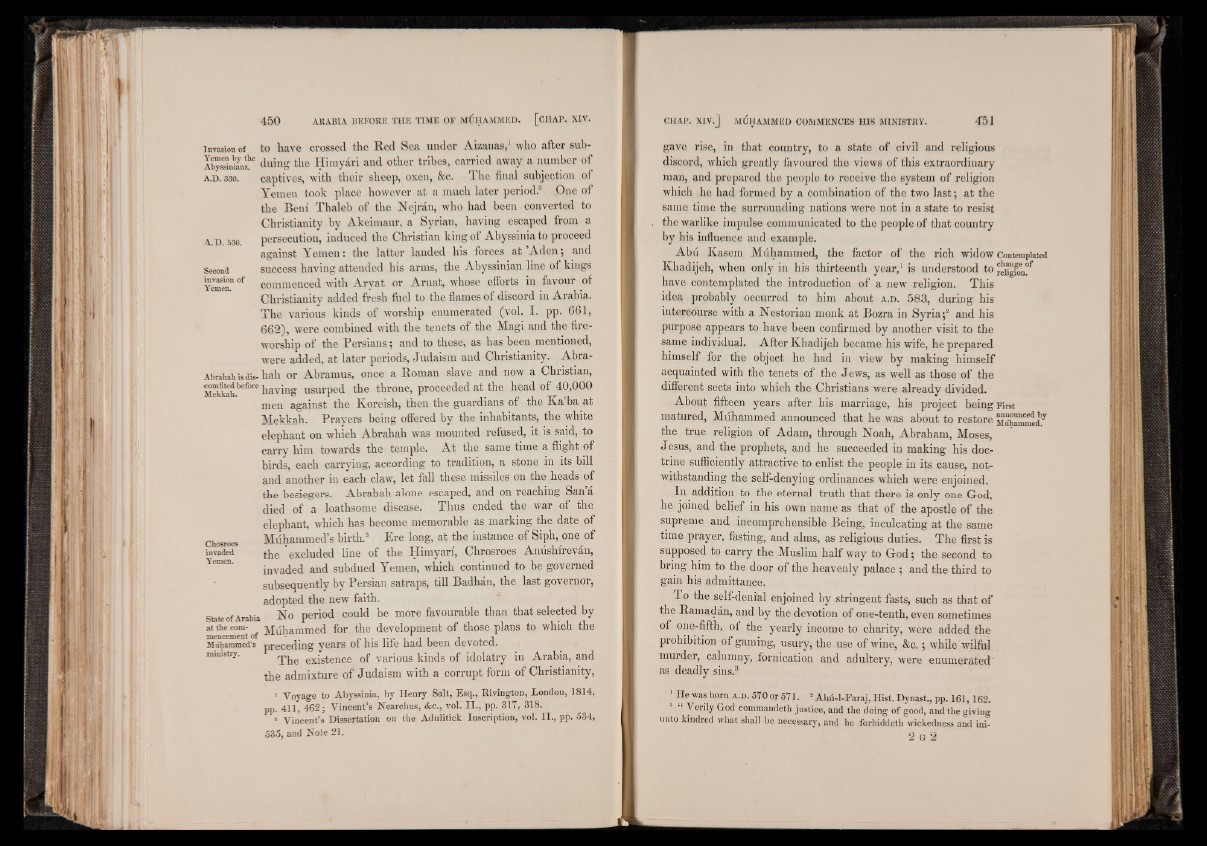
Invasion of to have crossed the Red Sea under Aizanas,1 who after sub-
IbySniaoshC duing the Himyari and other tribes, carried away a number of
a .d . 330. captives, with their sheep, oxen, &c. The final subjection of
Yemen took place however at a much later period.2 One of
the Beni Thaleb of the Nejran, who had been converted to
Christianity by Akeimaur, a Syrian, having escaped from a
A.D. 530. persecution, induced the Christian king of Abyssinia to proceed
against Yemen: the latter landed his forces a t ’Aden; and
Second success having attended his arms, the Abyssinian line of kings
™ of commenced with Aryat or Aruat, whose efforts in favour of
Christianity added fresh fuel to the flames of discord in Arabia.
The various kinds of worship enumerated (vol. I. pp. 661,
662), were combined with the tenets of the Magi and the fire-
worship of the Persians; and to these, as has been mentioned,
were added, at later periods, Judaism and Christianity. Abra-
Abrahah isdis- hah or Abramus, once a Roman slave and now a Christian,
Mekkah.before having usurped the throne, proceeded at the head of 40,000
men against the Koreish, then the guardians of the Ka'ba at
Mekkah. Prayers being offered by the inhabitants, the white
elephant on which Abrahah was mounted refused, it is said, to
carry him towards the temple. At the same time a flight of
birds, each carrying, according to tradition, a stone in its bill
and another in each claw, let fall these missiles on the heads of
the besiegers. Abrahah alone escaped, and on reaching San a
died of a loathsome disease. Thus ended the war of the
elephant, which has become memorable as marking the date of
Chosroes Muhammed’s birth.3 Ere long, at the instance of Siph, one of
invaded | | g ’excluded line of the Himyari, Chrosroes Amishirevan,
invaded and subdued Yemen, which continued to be governed
subsequently by Persian satraps, till Badhan, the last governor,
adopted the new faith,
stateof Arabia No period could be more favourable than that selected by
at the com- Muhamined for the development of those plans to which the
Muhammed’s preceding years of his life had been devoted.
nnfflStrT' The existence of various kinds of idolatry in Arabia, and
the admixture of Judaism with a corrupt form of Christianity,
1 Voyage to Abyssinia, by Henry Salt, Esq., Rivington, London, 1814,
pp. 411, 4 6 2 ; Vincent’s Nearchus, &c., vol. I I ., pp. 317, 318.
2 Vincent’s Dissertation on the Adulitick Inscription, vol. I I .. pp. 534,
535, and Note 21.
gave rise, in that country, to a state of civil and religious
discord, which greatly favoured the views of this extraordinary
man, and prepared the people to receive the system of religion
which he had formed by a combination of the two last; at the
same time the surrounding nations were not in a state to resist
the warlike impulse communicated to the people of that country
by his influence and example.
Abií Kasem Múhammed, the factor of the rich widow Contemplated
Khadijeh, when only in his thirteenth year,1 is understood to ,eUgfmi?f
have contemplated the introduction of a new religion. This
idea probably occurred to him about a .d . 583, during his
intercourse with a Nestorian monk at Bozra in Syria;2 and his
purpose appears to have been confirmed by another visit to the
same individual. After Khadijeh became his wife, he prepared
himself for the object he had in view by making himself
acquainted with the tenets of the Jews, as well as those of the
different sects into which the Christians were already divided.
About fifteen years after his marriage, his project being First
matured, Múhammed announced that he was about to restore
the true religion of Adam, through Noah, Abraham, Moses,
Jesus, and the prophets, and he succeeded in making his doctrine
sufficiently attractive to enlist the people in its cause, notwithstanding
the self-denying ordinances which were enjoined.
In addition to the eternal truth that there is only one God,
he joined belief in his own name as that of the apostle of the
supreme and incomprehensible Being, inculcating at the same
time prayer, fasting, and alms, as religious duties. The first is
supposed to carry the Muslim half way to God; the second to
bring him to the door of the heavenly palace ; and the third to
gain his admittance.
To the self-denial enjoined by stringent fasts, such as that of
the Ramadán, and by the devotion of one-tenth, even sometimes
of one-fifth, of the yearly income to charity, were added the
prohibition of gaming, usury, the use of wine, &c.; while wilful
murder, calumny, fornication and adultery, were enumerated'
as deadly sins.3
1 He was born a .d . 570 or 571. 2 AUÚ-1-Faraj, Hist. Dynast., pp. 161,162.
Verily God commandeth justice, and the doing of good, and the giving
unto kindred what shall be necessary, and he forbiddeth wickedness and ini-
2 g 2